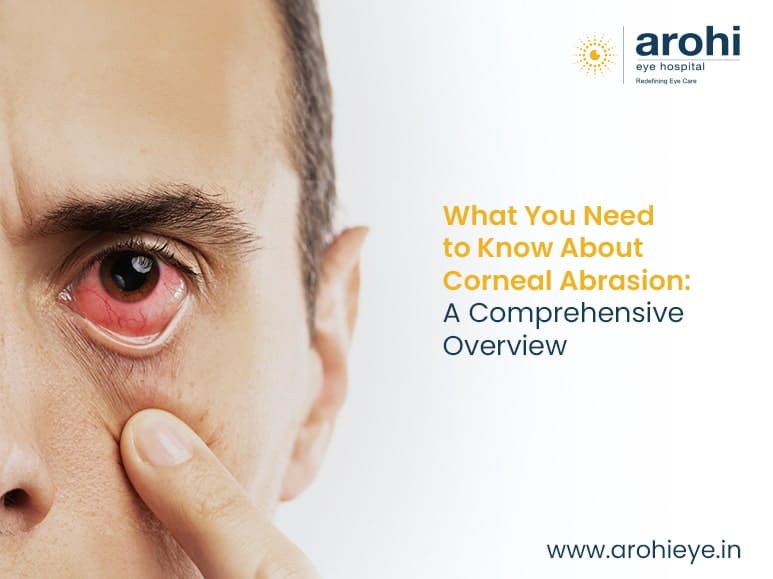Article Reviewed By: Dr. Shradha Goel
Table of Contents
What is Corneal Abrasion?
Symptoms of Corneal Abrasion:
Diagnosis of corneal abrasions:
Treatment Options for Corneal Abrasion :
Prevention:
Get the Best Eye Care at Arohi Eye Hospital:
A corneal abrasion is a condition where a superficial scratch on the clear, protective “ window” of the eye (cornea). The cornea can be scratched by contact with dust, dirt, sand, wood shavings, plant matter, metal particles, contact lenses, or even the edge of a piece of paper.
If you have this injury, book a medical appointment and get your eye checked. Without proper care, an infection could develop, causing more and more collateral damage.
In this blog, we’ll discuss corneal abrasion, its symptoms, diagnosis, prevention, and treatment options.
What is Corneal Abrasion?
A corneal abrasion is an injury to the clear protective layer covering the front of the eye, known as the cornea. This essential component of vision acts like a window, focusing light onto the retina. It can often occur due to foreign objects, trauma, or improper contact lens use.
Symptoms may include discomfort, light sensitivity, and the sensation of having something in the eyes.
Prompt medical attention is essential to prevent potential complications and ensure proper healing. Treatments may include antibiotic ointments to prevent infection and lubricating eye drops to promote healing. In severe cases, doctors may apply a patch or contact lens bandage to protect the injured cornea. Patients should avoid rubbing their eyes and carefully follow their doctor’s instructions for optimal recovery. If you are facing this issue, then you should visit the best eye hospital in Mumbai for better treatment and care.
Symptoms of Corneal Abrasion:
Well, when it comes to corneal abrasion, the symptoms can be divided into immediate and delayed.
The immediate symptoms are:
- Intense pain in the eye
- The feeling of something in the eye
- Excessive tearing
- Redness
- Sensitivity to light (photophobia)
- Blurred vision
Delayed Symptoms:
- Persistent discomfort or pain
- Increased sensitivity to light
- Continued tearing and redness
- Difficulty keeping an eye open
The severity of these symptoms can vary widely depending on the extent of the corneal abrasion. A minor abrasion may cause discomfort and tearing but generally heal quickly with minimal intervention.
If you face severe abrasions, they can cause significant pain and prolonged discomfort and may require medical treatment to prevent major complications such as infections or scarring. It is important to seek prompt medical attention to ensure proper healing and prevent further damage to the eye.
Diagnosis of corneal abrasions:
During an initial examination, an eye doctor assesses various aspects of eye health. The doctor measures visual acuity by having the patient read from an eye chart and examines the external and internal structures of the eye to identify any abnormalities. They also assess eye movements and alignment, evaluate tear production, and measure intraocular pressure to screen for conditions such as glaucoma.
There are several tools and techniques utilized to diagnose corneal abrasions. One common method involves applying a fluorescein stain to the surface of the eye. The dye helps highlight any areas of damage or abrasions on the cornea under a cobalt blue light. Additionally, a slit – lamp allows the doctor to examine the cornea in detail. These diagnostic tools enable precise identification and assessment of corneal abrasions, guiding appropriate treatment decisions. If you are facing such issues, then getting your checkup done with the cornea specialist in Mumbai is important.
Treatment Options for Corneal Abrasion :
For immediate at-home care of corneal abrasions, it’s essential to avoid rubbing the eyes and protect them from further damage by wearing sunglasses. Applying a cold compress can help reduce swelling and discomfort. To prevent further irritation, it is crucial to refrain from wearing contact lenses until the abrasion has healed.
Medical treatment options for corneal abrasions typically involve using antibiotic eye drops or ointments to prevent infection. Additionally, pain relievers such as over-the-counter analgesics may be recommended to manage discomfort.
Sometimes, a doctor may prescribe a cycloplegic eye drop to help relax the muscles in the eye and reduce the pain in corneal abrasion.
Follow-up visits with an eye doctor are vital to monitor the healing process and ensure that the abrasion is getting better properly. These visits also allow for adjustments to treatment if needed and provide an opportunity for the doctor to address any concerns or complications that may arise during the healing process. Regular follow-up care plays a crucial role in promoting optimal recovery and preventing potential complications.
Prevention:
To prevent corneal abrasions, it’s important to wear appropriate eye protection during activities such as sports, construction work, or other activities that could expose your eyes to potential danger. When handling contact lenses, always practice good hygiene by washing your hands thoroughly before insertion or removal and following proper cleaning and storage guidelines provided by an eye care professional.
Additionally, you can also use protective eyewear products, such as goggles or safety glasses, to shield your eyes from flying debris or hazardous materials. These simple precautions can help to reduce the risk of corneal abrasions and maintain overall eye health. If you continue to experience issues, it’s advisable to consult a cornea specialist for the best treatment and care.
Get the Best Eye Care at Arohi Eye Hospital:
To protect your eyes from potential injury, use appropriate eyewear and practice proper contact lens hygiene. If you experience symptoms such as eye pain, redness, or sensitivity to light, seek medical attention promptly to prevent complications. Medical intervention can usually effectively treat corneal abrasions, so prioritize your eye health to maintain clear vision and overall well-being. Take care of your eyes, and don’t hesitate to reach out to a healthcare professional if needed.
If you are looking for a leading eye care facility dedicated to providing comprehensive eye care services, look no further than Arohi Eye Hospital. We have a team of highly skilled ophthalmologists and modern technology. We offer a wide range of treatments for various eye conditions, including corneal abrasions.
Our commitment to providing the best care to our patients is what sets us apart from the rest. Whether it is routine check-ups or specialized eye care, we are the best when it comes to maintaining optimal eye health.
Dr. Shradha Goel
Dr. Shradha Goel, Chief Surgeon at Arohi Eye Hospital, is a renowned Phaco-LASIK surgeon with over 10,000 surgeries to her credit. She earned her MBBS from Grant Medical College, Mumbai, and a Master’s in Ophthalmology from Kasturba Medical College, Manipal. As a member of the American Academy of Ophthalmology, Dr. Goel specialises in LASIK, refractive errors, and cataract treatments.


